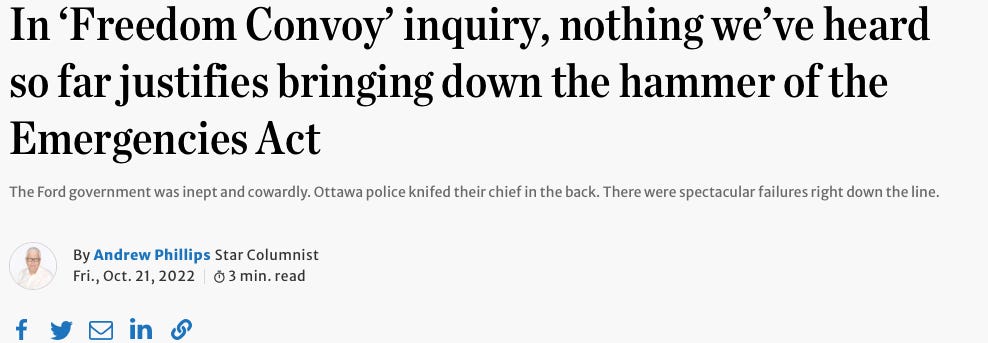When 'you think you're right even if you're wrong'
On belief perseverance, motivated reasoning - and where the media goes from here
There’s a phenomenon that I’ve been mulling over lately, and that is “belief perseverance.” The American Psychological Association defines this as “the tendency to maintain a belief even after the information that originally gave rise to it has been refuted or otherwise shown to be inaccurate.”
I found myself thinking about this a lot this past week, watching the Public Order Emergency Commission.
The Commission has already done much to complicate the dominant narrative on the trucker protests.
It makes me wonder: How will the Canadian media react?
Where do we go from here?
As a journalist, I strive to approach every story with high curiosity and low certainty, knowing that I could always be wrong — and that new facts could always emerge.
Time and time again, I hear from readers that this is what they want from us. That what they most need from journalists is a dispassionate pursuit of the truth. A fearless asking of questions, and a laying out of the findings for citizens to make up their own minds and take action as they see fit. Whether that’s voting someone out, or demanding accountability through institutional processes or bodies.
This is the model of journalism that I believe in, and aspire to. It trusts the public. And it values their trust in us.
Its foundational principle is the ability to admit when we’ve gotten something wrong.
But that seems to be happening less often these days.
Here’s a recent example — and one that continues to trouble me.
In August, Ottawa journalist Rupa Subramanya broke a major story. Court documents revealed that there was no scientific basis for the federal vaccine travel mandates.
These mandates were sold to Canadians as a necessary tool to “prevent future outbreaks.”
Prime Minister Justin Trudeau said that “no one is safe until everyone is safe.”
Omar Alghabra, Minister of Transport, said:
Requiring travellers and employees to be vaccinated ensures that everyone who travels and works in the transportation industry will better protect each other and keep Canadians safe.
But behind the scenes — as Rupa reported, based on court documents — the government scrambled to find evidence that this was the case:
In the days leading up to the implementation of the travel mandate, transportation officials were frantically looking for a rationale for it. They came up short.
That was made clear by an email exchange in the latter half of October 2021 between Aaron McCrorie and Dawn Lumley-Myllari. McCrorie is the associate assistant deputy minister for safety and security in Transport Canada, the department that houses COVID Recovery. Lumley-Myllari is an official in the Public Health Agency of Canada. In the email exchange, McCrorie seemed to be casting about for a credible rationale for the travel mandate. This was less than two weeks before the mandate was set to kick in.
“To the extent that updated data exist or that there is clearer evidence of the safety benefit of vaccination on the users or other stakeholders of the transportation system, it would be helpful to assist Transport Canada supporting its measures,” McCrorie wrote.
Four days later, on October 22, McCrorie emailed Lumley-Myllari again: “Our requirements come in on October 30”—in just over a week—“so need something fairly soon.”
On October 28, Lumley-Myllari replied to McCrorie with a series of bullet points outlining the benefits, generally speaking, of the Covid vaccine. She did not address McCrorie’s question about the transportation system, noting that the Public Health Agency of Canada was updating its “Public health considerations” with regard to vaccine mandates.
Two days later, on October 30, the travel mandate took effect.
As many of you know, I interviewed Rupa on the Lean Out podcast.
In the course of preparing that podcast for publication, I reached out to Transport Canada for comment. You can read its full statement here.
Transport Canada, given the opportunity, did not dispute any of the facts of Rupa’s reporting.
It maintained that “the vaccine mandate in the transportation sector limited the risk of COVID-19 transmission and infection” but offered no evidence to back up this claim.
Instituting a policy that restricts the mobility of roughly five million citizens without evidence-based rationale, constitutes, by any reasonable measure, a big story.
Yet almost no mainstream outlets covered it. And a few journalists actively derided Rupa’s reporting. Why?


In the past, the mainstream media’s standard practice for dealing with missteps was to issue corrections, or, in the case of egregious mistakes, offer an apology.
But this practice seems, of late, to have been replaced by three alternate strategies.
The first is to pretend that new facts do not exist. This is what we saw with Rupa’s reporting being mainly ignored.
The second strategy is to surreptitiously slip the new information in the public record. This was the case with The New York Times and the controversial 2020 New York Post Hunter Biden laptop story, which was censored on social media as misinformation in the lead-up to the American election.
The New York Times eventually reported that Hunter Biden’s emails were indeed authentic, more than a year after the fact, burying this admission deep in a story:
People familiar with the investigation said prosecutors had examined emails between Mr. Biden, Mr. Archer and others about Burisma and other foreign business activity. Those emails were obtained by The New York Times from a cache of files that appears to have come from a laptop abandoned by Mr. Biden in a Delaware repair shop. The email and others in the cache were authenticated by people familiar with them and with the investigation.
A third strategy, meanwhile, is to assert that a widely held and widely circulated belief — for instance, that Covid-19 vaccines prevent transmission — was actually never accurate in the first place.
We saw a version of this this past week with the AP, after Pfizer executive Janine Small testified at the European Parliament that the company did not know if the vaccine prevented transmission before it went to market.


All three of these media strategies represent a form of belief perseverance. They avoid a straightforward admission of error.
This week, a Lean Out reader helped me to better understand the mindset behind belief perseverance, referencing the below Julia Galef talk, “Why you think you’re right — even when you’re wrong.”
I had previously read Galef’s book, The Scout Mindset, but somehow it didn’t truly land for me until I watched this TED Talk.
In her talk, Galef explains that there is a “soldier mindset” — associated with protecting one’s side in a conflict — and then there is what she calls a “scout mindset,” which arises from a deep sense of curiosity.
As Galef put its, “The scout’s job is not to attack or defend. The scout’s job is to understand.”
“Having good judgment — making accurate predictions, making good decisions — is mostly about which mindset you’re in.”
The scout mindset is “the drive not to make one idea win or another lose, but just to see what’s really there as honestly and accurately as you can, even if it’s not pretty, or convenient, or pleasant.”
And: “[A scout’s] self-worth isn’t tied to how right or wrong they are about any particular topic.”
Galef concludes: “We need to learn how to feel intrigued instead of defensive when we encounter some information that contradicts our beliefs.”
If we take the soldier mindset, or motivated reasoning, into our work as journalists, we set ourselves up to make mistakes.
But if we act as scouts — if we ask ourselves, continually, “What if we’re wrong?” — we win even when we lose.








Yes yes yes - but as long as journalism schools are teaching students to be activists and editors are allowing this type of reporting I don’t see anything changing or improving in the future. There seems to be no motivation from anyone with any control to put a stop to this.
Yes and It is also that they are hypnotized by the appropriate govt narrative. They literally can not believe that it could be false. They are told that anyone who questions the narrative is an infidel. For example, in the case of contradicting the vax narrative, they are labeled an antivaxxer and hence automatically should not be listened to.
It is like a religious cult - if one person admits they were wrong they are instantly shamed and ostracized by all their liberal coworkers and friends the the Twitter-sphere. Or worse lose their job and maybe their marriage.
As Tara wrote a few weeks ago, it is really rather similar to high school girls who group together and are mean to anyone who disagrees with the group. With all the same underhand power games. Name calling. Rumors behind their backs. Ostracized from the group. This keeps all the members of their "club" in line. https://tarahenley.substack.com/p/gossip-girls